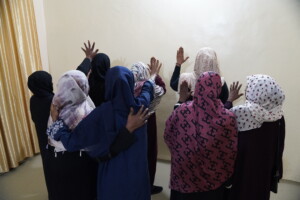Sudan rebel leader: Meetings between SRF and opposition ‘imminent’
Meetings are “imminent” between leaders of the opposition Forces for Freedom and Change (FFC) and the Sudan Revolutionary Front (SRF) (a coalition of armed movements) to discuss how to include the Addis Ababa agreement in the Constitutional Declaration, Dr Jibril Ibrahim, head of the Justice and Equality Movement (JEM) and deputy president of the SRF has told Radio Dabanga in an interview.
 Dr Jibril Ibrahim, head of the JEM and deputy president of the SRF (File photo)
Dr Jibril Ibrahim, head of the JEM and deputy president of the SRF (File photo)
Meetings are “imminent” between leaders of the opposition Forces for Freedom and Change (FFC) and the Sudan Revolutionary Front (SRF) (a coalition of armed movements) to discuss how to include the Addis Ababa agreement in the Constitutional Declaration, Dr Jibril Ibrahim, head of the Justice and Equality Movement (JEM) and deputy president of the SRF has told Radio Dabanga in an interview.
He expressed optimism that the Addis Ababa agreement would be included in the Constitutional Declaration before the final signing on August 17, he explained.
The SRF received positive signals from a number of members of the FFC in this regard.
Ibrahim pointed to the continuation of communication between the armed movements, the various political forces, African Union mediation, and the Transitional Military Council.
The military junta, in meetings with leaders of the SRF, did not object to the inclusion of the Addis Ababa agreement, while the AU mediation itself distanced itself from interference, considering it a private matter for the Sudanese, Dr Ibrahim said.
‘The SRF is ready to organise a mass demonstration next week’ – Dr Jibril Ibrahim
He stressed their keenness to communicate to clarify the view of the SRF on the Constitutional Declaration and explain the reasons for their rejection. Ibrahim said they were ready to organise a mass demonstration next week to demand that priority be given to peace and to include the Addis Ababa agreement in the Constitutional Declaration.
As reported by Radio Dabanga on August 5, the SRF officially rejected the Constitutional Declaration signed by Sudan’s ruling Transitional Military Council (TMC) and the opposition Forces for Freedom and Change (FFC).
The SRF says it has determined to communicate with the mediation and the military junta to amend it and include the vision of a just peace.
Rejection
Regarding the reasons for their rejection of the Constitutional Declaration, Ibrahim said that there are pivotal points that led them reject the declaration, namely the restriction of the peace agreements to be signed stipulated in the Constitutional Declaration in contravention of the Addis Ababa agreement that stipulated that the peace agreements prevail over the Political Declaration and the Constitutional Declaration.
“Setting a ceiling for the peace process does not encourage negotiations or implementation of the agreements,” the rebel leader said.
He criticised the refusal of the FFC to include the name of the SRF alliance and replacing it with “armed movements”, and considered it a setback for the Addis Ababa agreement, explaining that the SRF includes broad sectors that do not bear arms.
He confirmed their non-objection to amend the wording to “the SRF and other armed movements” to ensure the participation of other movements outside the SRF.
Addis Ababa Agreement
Ibrahim said that the Addis Ababa Agreement focused on giving peace a top priority, accusing the FFC of dealing selectively with the agreement and including what suits it.
He condemned the description of the Addis Ababa agreement as quotas and considered it an attempt to intimidate the already marginalised people living in the peripheries so as not to demand their rights in power.
Ibrahim challenged all parties to produce a document containing the demands of the SRF for specific quotas and seats.
He pointed out at the same time that the differences between FFC and the TMC have been limited in the past months on the seats of the Parliament, the Cabinet and the Sovereign Council.
Ibrahim wondered what is wrong with the people in the marginalised areas and the armed movements asking to participate in the institutions of the transitional period, and said, "We have not demanded seats for ourselves, but for our movements, entities and provinces."
He emphasised that the movements are entitled to appropriate representation for the implementation of the project for which the sacrifices had been made.
Ibrahim criticised the idea of a government of technocrats and independent competencies, pointing out that ministerial positions need political will and that the minister can use the technocrats whenever necessary.
‘There will be serious consequences in the event the Addis Ababa agreement is not included in the Constitutional Declaration’ – Dr Jibril Ibrahim
Dr Ibrahim warned of the “serious consequences" in the event the Addis Ababa agreement is not included in the Constitutional Declaration, stressing that the SRF will resort to the option of peaceful mass escalation and mobilising the public to force the political forces and the junta to submit to the option of peace.
He suggested resorting to other unnamed options in the event they are deprived of freedom of expression and demonstration.
He ruled out resorting to war again, hoping that they would not have to use that means, which had catastrophic effects.
On the future of their relationship with FFC in the absence of the Addis Ababa agreement, Ibrahim stressed the commitment of the SRF to work within the FFC and the alliance of Sudan Call.
Restructuring
He explained that the Addis Ababa Agreement provided for the restructuring of the FFC through the formation of a leadership body that ensures the fair representation of all parties, and the representation of the SRF as an independent bloc within the framework of freedom and change, expressing his hope the agreement would be implement.
Ibrahim accused the coordination of the FFC of kidnapping the decision of the FFC without returning to the other members of the coalition. He called for not continuing to divide the Sudanese society into a centre that wants to continue to dominate and a marginal absence, stressing their keenness to unite the Sudanese conscience beyond the narrow selfishness to reach Sudan that accommodates everyone.
Our editorial independence means that we can continue to provide factual updates about political developments to Sudanese and international actors, educate people about how to avoid outbreaks of infectious diseases, and provide a window to the world for those in all corners of Sudan. Support Radio Dabanga for as little as €2.50, the equivalent of a cup of coffee.












 and then
and then